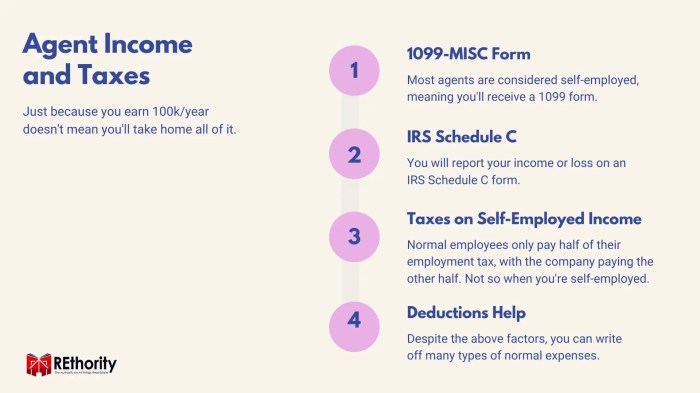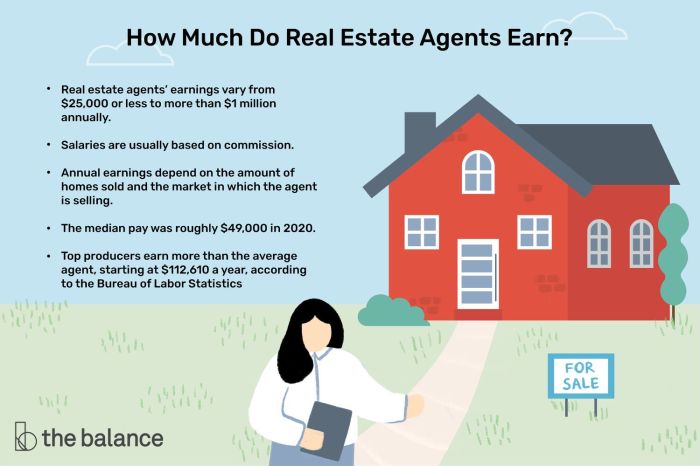How much does a real estate agent make in Chicago? That’s a question many aspiring agents and curious onlookers ask. This guide dives into the complexities of real estate agent income in the Windy City, exploring everything from average salaries and commission structures to additional income streams and the impact of market fluctuations. We’ll unpack the factors that determine how much a real estate agent can realistically earn, from experience level and property type to neighborhood and market conditions.
Get ready to uncover the secrets to success in Chicago’s competitive real estate market.
Chicago’s real estate market, like any major city, is dynamic. Agent earnings vary significantly depending on several key factors. We’ll analyze these factors, providing a clear picture of income potential for both seasoned professionals and those just starting their careers. This includes a breakdown of commission structures, additional income sources, and a realistic look at the expenses involved in building a successful real estate business in Chicago.
Average Earnings of Chicago Real Estate Agents

Source: rethority.com
So, you’re curious about how much a real estate agent in Chicago can actually make? It’s not a simple answer, as earnings vary wildly depending on experience, skills, and market conditions. Let’s break down the factors that contribute to the wide range of incomes.
The income of a Chicago real estate agent is primarily determined by commissions earned on successful property sales. These commissions are typically a percentage of the sale price, split between the buyer’s agent and the seller’s agent. Other factors, like the number of transactions completed annually, the types of properties handled (luxury condos versus starter homes), and the agent’s marketing and networking prowess, significantly impact their bottom line.
Income Ranges for Chicago Real Estate Agents
A significant difference exists between the earnings of experienced and newer agents. While precise figures are hard to pin down due to the variable nature of the profession, we can look at some general ranges. Keep in mind that these are broad estimations, and individual experiences can vary significantly.
| Experience Level | Average Annual Income | Income Range | Key Factors Affecting Income |
|---|---|---|---|
| New Agent (0-2 years) | $40,000 – $60,000 | $20,000 – $100,000 | Building clientele, learning market nuances, mastering negotiation skills, limited transaction volume. |
| Experienced Agent (3-5 years) | $80,000 – $120,000 | $50,000 – $200,000 | Established network, higher transaction volume, specialized property expertise (e.g., luxury homes, investment properties), effective marketing strategies. |
| Highly Experienced Agent (5+ years) | $150,000+ | $100,000 – $500,000+ | Extensive network, high transaction volume, strong reputation, potentially multiple team members, focus on high-value properties, sophisticated marketing and client management. |
For example, a new agent might struggle to close many deals in their first year, leading to a lower income. Conversely, a highly experienced agent with a strong reputation and established network might consistently close high-value deals, resulting in a much higher income. Market conditions also play a significant role; a booming market will naturally lead to higher commission earnings for all agents.
Commission Structures and Income Calculations

Source: howmuchdotheymake.com
Understanding how Chicago real estate agents earn their income requires a look at commission structures and how they’re calculated. This involves the split between the agent and their brokerage, the commission rate itself, and how that translates into a final paycheck.The typical commission split in Chicago between a real estate agent and their brokerage is usually a percentage of the total commission earned on a sale.
A common split is 50/50, meaning the agent receives half, and the brokerage receives the other half. However, this can vary depending on the brokerage, the agent’s experience level, and the terms of their contract. Some brokerages may offer a more favorable split for top-performing agents, while others may have a tiered system based on sales volume.
Commission Rates and Their Variation
Commission rates in Chicago, like in most areas, are typically a percentage of the final sale price of the property. This percentage isn’t fixed and can range from 5% to 6%, or even higher or lower depending on several factors. For example, a luxury home sale might command a lower commission rate as the overall dollar amount is already substantial.
Conversely, a lower-priced property might have a slightly higher commission rate to make it financially worthwhile for the agent. The type of transaction also influences the commission. For example, commercial real estate transactions often have different commission structures than residential sales. These structures might involve a flat fee, a percentage of the lease value, or a hybrid model.
Calculating an Agent’s Earnings from a Single Transaction
Let’s illustrate how to calculate an agent’s earnings with an example. Suppose a Chicago real estate agent sells a home for $500,000. The agreed-upon commission rate is 5.5%, and the agent’s split with their brokerage is 50/50.First, calculate the total commission: $500,000 (Sale Price)
0.055 (Commission Rate) = $27,500 (Total Commission)
Next, determine the agent’s share: $27,500 (Total Commission)
0.5 (Agent’s Split) = $13,750 (Agent’s Earnings)
Therefore, in this scenario, the agent would earn $13,750 from this single transaction before taxes and other expenses. Remember that this is a simplified calculation. In reality, agents often face expenses such as marketing costs, professional development fees, and other business-related costs that will reduce their net income.
Income Sources Beyond Commissions: How Much Does A Real Estate Agent Make In Chicago

Source: thebalancemoney.com
While commission income forms the backbone of a Chicago real estate agent’s earnings, savvy agents often diversify their income streams to enhance their financial stability and overall earning potential. These supplemental income sources can significantly boost annual income, providing a buffer against market fluctuations and allowing for greater financial security. Understanding these additional revenue streams is crucial for a comprehensive view of potential earnings in the Chicago real estate market.Many successful Chicago real estate agents supplement their commission-based income with a variety of additional revenue streams.
These secondary income sources can provide a significant boost to overall earnings and offer greater financial stability, especially during slower market periods. The amount earned from these sources varies greatly depending on the agent’s network, marketing strategies, and business acumen.
Referral Fees
Referral fees represent a significant opportunity for Chicago real estate agents to expand their income. By building strong relationships with other professionals in related industries—mortgage brokers, home inspectors, insurance agents, contractors, and even other real estate agents in different areas—agents can generate substantial referral income. For instance, an agent who successfully refers a client to a mortgage broker might receive a fee for each successful mortgage closing facilitated through that referral.
Similarly, referring clients to home inspectors or contractors can yield fees based on the service provided. The specific fee amount varies depending on the agreement between the referring agent and the referred professional. A successful referral network can generate a consistent stream of income beyond traditional real estate transactions.
Bonuses and Incentives
Many real estate brokerages in Chicago offer bonus programs to their agents based on performance metrics such as the number of transactions closed, the total sales volume generated, or the achievement of specific sales targets. These bonuses can be substantial, offering a significant boost to an agent’s overall income. For example, a brokerage might offer a bonus for exceeding a predetermined sales quota or for consistently maintaining high client satisfaction ratings.
Furthermore, some developers offer incentives to agents for selling their properties, providing additional earning opportunities. These bonuses act as performance-based rewards and can significantly impact an agent’s annual income.
Rental Income
Some Chicago real estate agents supplement their income by owning and managing rental properties. This strategy offers a stable, passive income stream that can complement their commission-based earnings. The profitability of rental properties depends on factors such as location, property value, rental rates, and operating expenses. For instance, an agent might own a condo in a high-demand area, generating rental income that offsets expenses and contributes to their overall financial well-being.
This strategy, however, requires significant upfront investment and ongoing management responsibilities.
Factors Affecting Real Estate Agent Income in Chicago
A real estate agent’s income in Chicago isn’t a fixed number; it’s highly variable, influenced by a complex interplay of factors. Understanding these factors is crucial for both aspiring and established agents to strategize for success and manage expectations. This section will explore the key elements affecting earnings, focusing on neighborhood variations, market dynamics, and broader economic trends.
Neighborhood Variations in Income Potential
Chicago’s real estate market is far from uniform. Affluent neighborhoods like Lincoln Park, Gold Coast, and Streeterville typically command higher property values and consequently, higher commission payouts for agents. These areas often see a greater volume of luxury sales, boosting potential earnings significantly. Conversely, neighborhoods with lower average property prices, such as some parts of the South Side or West Side, will generally yield lower commissions per transaction.
The number of transactions, however, could potentially offset this lower per-transaction income in some cases. An agent specializing in high-volume, lower-priced properties in a rapidly developing area could potentially earn a comparable income to an agent focused on fewer, higher-priced properties in a more established neighborhood. The key difference lies in the agent’s market niche and business strategy.
Market Conditions and Agent Earnings, How much does a real estate agent make in chicago
The real estate market’s condition—buyer’s market or seller’s market—dramatically impacts agent income. In a seller’s market (more buyers than sellers), properties sell quickly at or above asking price. Agents can close more deals in less time, leading to higher overall earnings. A competitive seller’s market also often translates to higher commission rates as sellers are more willing to negotiate.
In contrast, a buyer’s market (more sellers than buyers) means properties take longer to sell, often at prices below asking price. Agents may experience fewer closed deals and reduced commission income. For example, during the 2008 housing crisis, many Chicago agents experienced a significant downturn in income due to the prolonged buyer’s market that ensued.
Economic Trends and Real Estate Agent Income
Chicago’s overall economic health significantly impacts real estate agent income. Periods of economic growth, low unemployment, and increased consumer confidence generally lead to a more active real estate market. This translates to more sales, higher property values, and increased agent commissions. Conversely, economic downturns, job losses, and decreased consumer confidence can dampen the market, leading to fewer sales and lower agent income.
For example, the tech boom in recent years has fueled demand in certain Chicago neighborhoods, increasing property values and agent commissions in those specific areas. Conversely, a recession could lead to a drop in sales and reduced agent earnings across the board. Interest rates also play a significant role; higher interest rates often cool the market, impacting agent income, while lower interest rates can stimulate activity and boost earnings.
Lifestyle and Expenses of Chicago Real Estate Agents

Source: gorepa.com
Being a real estate agent in Chicago is a demanding yet potentially rewarding career. The lifestyle is often characterized by flexibility but also requires significant self-discipline and adaptability to succeed in a competitive market. Expenses can be substantial, impacting the ultimate profitability of the role. Understanding both the lifestyle and the financial realities is crucial for anyone considering this path.
Typical Work Schedule and Lifestyle
The work schedule of a Chicago real estate agent is highly variable and often unpredictable. While there are no set office hours, agents frequently work evenings and weekends to accommodate client schedules, showings, and open houses. This can lead to a blurring of lines between work and personal life, requiring strong time management skills. Successful agents often find themselves networking at industry events, attending continuing education courses, and consistently marketing their services, all adding to their workload.
The unpredictable nature of the business can mean periods of intense activity followed by quieter stretches, making consistent income generation a challenge requiring effective planning and proactive client engagement.
Common Business Expenses for Chicago Real Estate Agents
Operating as a real estate agent in Chicago involves significant recurring and one-time expenses. Marketing costs are substantial, often including online advertising (Zillow, Realtor.com, etc.), print advertising (local publications, flyers), and potentially sponsoring local events. Technology is another major expense; this includes website maintenance, CRM software subscriptions, professional photography for property listings, and potentially virtual tour creation services.
Continuing education is necessary to maintain licenses and stay updated on market trends, adding to the overall cost. Professional development may involve attending conferences, workshops, or hiring a business coach. Finally, there are also miscellaneous expenses like car maintenance (crucial for showing properties), professional attire, and office supplies. A detailed breakdown of these costs is essential for accurate budgeting.
Hypothetical Budget for a Chicago Real Estate Agent
Let’s consider a hypothetical scenario for a Chicago real estate agent in their second year, aiming for a reasonable level of financial security. Assume an average annual commission income of $80,000 (this is a variable figure, and significantly higher or lower incomes are possible).
| Income | Amount |
|---|---|
| Annual Commission Income | $80,000 |
| Expenses | Amount |
|---|---|
| Marketing & Advertising | $10,000 |
| Technology & Software | $5,000 |
| Professional Development | $2,000 |
| Car Expenses (Maintenance, Gas, Insurance) | $4,000 |
| Office Supplies & Miscellaneous | $1,000 |
| Health Insurance | $7,000 |
| Self-Employment Taxes (estimated 15.3%) | $12,240 |
| Total Expenses | $41,240 |
Note: This budget is a simplified example and actual expenses can vary significantly based on individual circumstances and business strategies. The self-employment tax is a significant factor and needs to be carefully accounted for. This budget also doesn’t include personal living expenses.
Career Progression and Earning Potential

Source: realestatelicensetraining.com
Becoming a successful real estate agent in Chicago is a journey, not a sprint. Earning potential significantly increases with experience, skill development, and strategic career choices. The path to higher income involves building a strong reputation, expanding your network, and potentially specializing in a niche market.The career trajectory for a Chicago real estate agent typically follows a pattern of growth, with income directly correlating to the number of successful transactions completed.
Early years often involve learning the ropes, building a client base, and mastering negotiation and marketing techniques. As experience grows, so does the ability to handle more complex deals, command higher commissions, and attract higher-value clients.
Career Advancement Opportunities
Experienced agents can transition into leadership roles within their brokerage firms, mentoring newer agents or managing teams. This often comes with a significant salary increase, moving beyond commission-only structures to include a base salary and performance bonuses. Some agents might even choose to open their own brokerage, leveraging their established network and expertise to build a larger and more profitable business.
This entrepreneurial path requires significant capital investment and business acumen, but offers the highest potential earning ceiling.
Impact of Certifications and Specializations
Obtaining additional certifications, such as the Certified Residential Specialist (CRS) designation or the Accredited Buyer’s Representative (ABR) designation, can significantly enhance a real estate agent’s credibility and earning potential. These certifications demonstrate a commitment to professional development and expertise in specific areas, attracting clients seeking high-level service and specialized knowledge. Specializing in a niche market, such as luxury properties, commercial real estate, or a specific geographic area within Chicago, can also lead to higher commission rates and increased income, as these markets often command premium prices and require specialized skills.
Income Growth Potential Over Time
Imagine a graph charting income over time. The initial years would show a relatively slow, upward trend as the agent builds their clientele and experience. This is the learning curve. Years 3-5 would show a steeper incline, as the agent refines their skills and network, resulting in more transactions and higher commission earnings. Beyond five years, the growth trajectory could flatten somewhat, but successful agents often experience periods of significant income spikes, particularly when they secure high-value listings or develop strong referral networks.
For example, an agent might earn $50,000 in their first year, $80,000 in year three, $120,000 in year five, and potentially $200,000 or more annually after a decade of consistent success, particularly if they have moved into management or developed a specialized niche. This is not a guaranteed trajectory, but rather a representation of the potential for significant income growth with experience, skill development, and strategic career choices.
Factors such as market conditions and the agent’s personal drive will influence the actual outcome.
Conclusive Thoughts

Source: agentstory.com
So, how much
-does* a Chicago real estate agent make? The answer, as we’ve seen, isn’t a simple number. It’s a dynamic figure shaped by experience, market conditions, individual effort, and smart business strategies. By understanding the commission structure, exploring additional income streams, and managing expenses effectively, agents can significantly impact their earning potential. While the initial investment of time and resources is considerable, the potential rewards in Chicago’s vibrant real estate market are substantial for those willing to put in the work.
